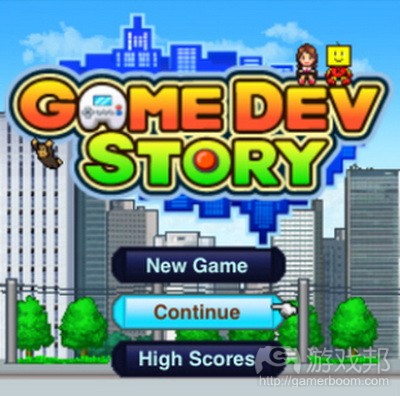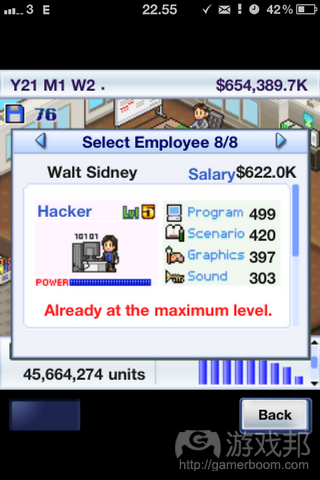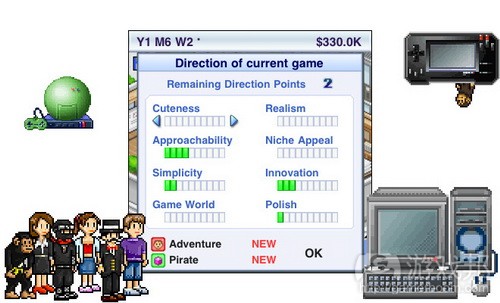《Game Dev Story》蕴含的7点游戏开发经验
作者:Luis Levy
《Game Dev Story》出自Kairosoft之手,是日本首款入驻功能手机的传统PC游戏,游戏2010年底也移植iOS和Android平台。在很多人看来,它是迄今最具沉浸性的移动游戏之一。
众所周知,《GDS》是款大亨型商业模拟游戏,游戏目标是玩家通过开发掌机和PC内容白手创建游戏公司。游戏非常有深度:不仅通过引入掌机紧跟电子游戏发展步伐,甚至还向各个平台收取巨额授权费。
许多游戏机制实例都有些荒谬,就像之前提到的“Lunar Writing”。此外,游戏中蕴含宝贵游戏开发经验,促使玩家着眼大局——这要归功于这款移动游戏。
1. 开发者
史蒂夫·鲍尔默(游戏邦注:微软首席执行官)说得好:所有开发商都不可或缺。《GDS》引入电脑黑客元素,这些才华横溢的开发人员能够单枪匹马拯救你的公司。黑客无所不能——编程、编剧、画面和音效,从中我们发现,开发人员比融资、场所和吉祥物更重要,他们才是决定工作室成败的关键。他们是整个公司的灵魂。忽略这点的玩家通常将资金用于解决问题,宣传/升级和聘请外部人员,因此无法制作出优秀作品。此外,若你试图靠外包工作积累足够资金,然后聘请杰出开发人员,这只成功一半。
2. 承接外包工作的意义
什么比拥有新IP的穷困工作室更胜一筹?那就是灯火通明,衣食无忧的工作室。《GDS》允许玩家承接外包工作(游戏邦注:合约介于几十万-140万美元之间)。在新作开发间隙,承接外包工作能够丰富开发人员的经验(研究积分),向工作室提供必要资金。游戏同时还能告知玩家及时完成项目的重要性,且承接过大项目风险太大(就像解剖掌机,重新开发游戏引擎)。重视外包工作:它们能够维持工作室运作,帮助其着手下个项目。
3. 合理选择平台
《GDS》玩家存在的一个普遍错误是投资购买多个不同掌机授权。这些授权非常昂贵,所以工作室很容易就耗尽现金,无法支持开发工作。若有玩家腾出时间观察整个市场,就会清楚发现各平台地位不平等。有些平台更受小朋友欢迎,有些平台市场份额更大。游戏遵循行业发展顺序,因此Game Kid(即任天堂GameBoy)比Virtual Kid(即Virtual Boy)更具投资保障。所以授权Game Kid能够创收几年,而授权Virtual Kid却会让工作室破产。选择正确平台,并持之以恒,这是游戏获得发展的关键。
4. 充分、有效打广告,认真对待公关工作
《GDS》的很多广告都非常好笑。行进乐队?小型飞船赞助广告?Lunar Writing?!但游戏清楚展示其中收获:粉丝。粉丝将直接转换成收入。待20年过后,多数玩家都是钱包鼓鼓。那时你就会发现加大广告和发行投入的益处。制作期间你可以进行大力宣传,一次在调试前,最后一次在发行后。若时间调节合理(游戏邦注:迎合年度GameDex或E3/PAX/GDC大会),销量将直线上升。另外一个常见错误是在最新项目中投入所有资金,致使营销毫无预算。当现实生活中的开发商犯下类似错误时,结果将非常残酷。
5. 众多续集将致使粉丝流失
若作品有幸入驻热门榜单,你就会制作续集。续集获得大量广告宣传,且融入经验积分,所以比原作略胜一筹。同样这会带来更高销量。一切都令人非常满意,谁不希望销量提高?但粉丝似乎不喜欢过多相同主题/类型的作品。在游戏初期阶段,我发现射手/机器人是个完美组合,所以推出了3个《RobotoZ》续集,《RobotoZ》是我的射击/机器人作品。很快,我的粉丝就开始大量流失。在《GDS》中,玩家讨厌重复体验相同内容。连续制作风靡主题游戏有欠考虑,多元化能够大大扩宽工作室的覆盖范围。这是传统游戏开发商从iPhone开发中获得的经验:《机场空管》开发商Firemint还推出《真实赛车》,这是两款截然不同的作品。
6. 不满某大型AAA工作室?那么卷土重来
常有游戏开发人员不满当前工作。或管理差劲,或因他们厌倦制作相同WWII FPS。《GDS》玩家能够在20年后退出游戏,但不会在前款作品中透露游戏/类型。这就像现实生活中的离开某公司,加入新公司。开发商离开某工作室,也就舍弃所有所学内容。如今他们拥有之前没有的知识、技能和技术。更好的是,他们可以在新公司使用这些技能。他们能够重新收获快乐,制作更好的作品。
7. 预先计划
计划对任何商业活动而言都是基本技能。给员工休假制定计划。给公司年度税金制定计划。那么若你有个8人团队,每年将有500万美元从你的帐户中扣除,用于支付员工工资。若你没有这么多钱,公司就会破产。游戏并未融入罢工、不满员工和法律诉讼元素,而存储足够资金也不是什么新构思,但这个构思非常巧妙。另一例子:获得索尼PlayStatus授权后,我希望等PlayStatus 2问世再进行升级。成本非常昂贵,所以我开始积攒资金,这样就能得到授权,制作游戏。若玩家缺乏远见,便无法购得授权,给员工发放工资(游戏邦注:这在现实生活中司空见惯)。《Game Dev Story》简直是一语道破玄机。(本文为游戏邦/gamerboom.com编译,如需转载请联系:游戏邦)
“Game Dev Story”: 7 Valuable Lessons for Game Developers
by Luis Levy
Created by developer Kairosoft, Game Dev Story is an ancient PC game that was first ported to feature phones in Japan then launched on iOS and Android in late 2010. The game is now considered by many one of the most addictive mobile games ever made while also becoming a critical darling.
(STOP! Don’t download it before reading the whole post or you might never come back!)
As many of you know, GDS is a tycoon-like business simulation where the objective is to build a game company from scratch through console and PC development. The game is surprisingly deep: not only it manages to closely follow actual video game history by introducing consoles we can all identify, it even charges hefty license fees for each one of them (!)
Many instances of the gameplay border on the absurd as the above-mentioned “Lunar Writing.” On the other hand, there are valuable lessons about game development spread throughout the game. It gets players thinking about the big picture — an awesome feat for a tiny mobile game.
1. Developers, developers, developers
Steve Ballmer had it right: developers are all that matters. GDS will introduce you to Hackers — supremely talented developers that can single-handedly save your company. While Hackers are unrealistically good at everything — Program, Scenario, Graphics and Sound — they teach us that more than funding, cool digs and a mascot, developers are the ones that can make or break a studio. They are the soul of the whole enterprise. Players who disregard this will often throw money at the problem, spend in boosts/power-ups, hire outside talent and never, ever, get an all-around great game. On the other hand, if you focus on generating enough capital from contracts then hiring talented devs, that’s half the battle right there.
2. The value of contracts
What’s better than a broke studio with amazing new IP? A studio where the lights are on and there’s food in the rec room. GDS allows players to invest time fulfilling outside contracts ranging from a few hundred thousand to $1.4 million dollars. In between new games, contracts give developers experience (Research Points) and provide much-needed cash for the studio. The game also teaches players that delivering a project on time is always a good idea (duh!) and that it’s risky to take on a project too big for your team (like dissecting a console or developing a new game engine from scratch). Treasure your contracts: they might keep you alive just enough to ship your next IP.
3. Choose your platform wisely
A common mistake in GDS is to spend money buying several different console licenses. Since they’re really expensive, it’s quite easy to run out of cash and not have enough to actually make a game. Now, if a player takes his or her time to scope the market, it becomes clear that not all consoles are made equal. Some are stronger with kids; others have more market share. Since the game follows history, the Game Kid (a Nintendo GameBoy) is a much safer investment than the Virtual Kid (the Virtual Boy). So a license to the Game Kid pays for itself in a few years while a license to the Virtual Kid can bankrupt your studio. Picking the right platform — and sticking with it — is crucial to really move forward within the game.
4. Advertise often, advertise well — and take PR seriously
Many of the advertising activities in GDS are laughable. A marching band? Blimp sponsorship? Lunar Writing?! However, the game does make a point of showing what you can get out of it: fans. And fans translate directly into revenue. By the time the 20-year session is over, most players will have tons of cash. That’s when you realize how much better is to actually budget for advertising and PR. You can do a push during development, one right before debugging (beta?) and a final one right after launch. If timed right — or near the yearly GameDex, an E3/PAX/GDC of sorts — sales will soar. On the other hand, a common mistake is to pump all the money in the latest title and leave zero, nada, for marketing. When real-life developers make the same mistake, the consequences can be, let’s say, brutal.
5. Serial sequels can kill your fan base
If your game make the Hall of Fame, you get to make sequels. Sequels have some hype and experience points built-in, so they tend to be superior to the original game. Which, again, translates in better sales. This is all fine and dandy — who here doesn’t want an increase in sales? — but fans tend to disprove of too many games in the same theme/genre combination. Early in the game, I found out that Shooter/Robot was a winning combination so I made three sequels in a row of RobotoZ, my Shooter/Robot franchise. Soon enough, my fans started dropping like flies. According to GDS, they were fed up with the same game over and over again. While making games in crazy theme/genre combinations is ill-advised, variety can greatly expand a studio’s reach. This is a lesson iPhone development is teaching more traditional game developers: Firemint, the company behind Flight Control also developed Real Racing, two huge titles in very different genres.
6. Unhappy at a big AAA studio? Start over
It’s common to find game developers unhappy at their present location. Maybe management sucks; maybe they’re tired of making the same WWII FPS. GDS allows players to quit a game after 20 years, but keep the themes/genres unlocked in the previous game. This is just like leaving a company to start/join a new one in real life. When developers leave a studio behind, they leave with what they learned. They now have knowledge, skills, techniques they didn’t have before. Better yet, they can use those in the new company. They can go back to being happy and making even better games.
7. Plan ahead
Planning is a basic skill in any business. Plan for employee vacations. Plan for your yearly taxes. Plan for tough market conditions. GDS illustrates that mechanic with a yearly salary deduction. So if you have a team of 8, every year $5,000,000 will be deducted from your bank account to pay for salaries. If you don’t have the money, you might go bankrupt. The game doesn’t institute strikes, unhappy employees and lawsuits but the idea of having enough money in the bank for future expenses may not be novel but it’s certainly wise. Another example: having acquired a license for the Sonny PlayStatus, I wanted to wait until the PlayStatus 2 came out to upgrade. Since I knew the costs would be high, I stock-pilled on cash so I was ready to get the license AND make a great game. If a players lacks vision, they have trouble getting licenses and paying employees, something we’ve all witnessed in real-life. Touché, Game Dev Story.
I could have made this into a top 10 easily. How about you? Did you try Game Dev Story? What else would you add to the list?(Source:gamasutra)
下一篇:评述移动游戏公开发行的7大误区










































 闽公网安备35020302001549号
闽公网安备35020302001549号